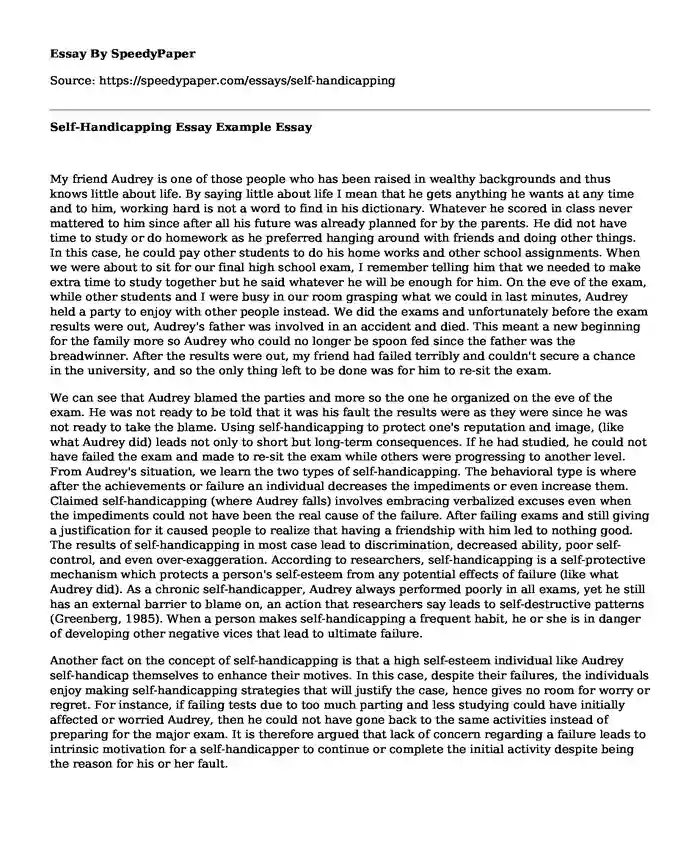
| Type of paper: | Essay |
| Categories: | Personal experience |
| Pages: | 3 |
| Wordcount: | 656 words |
My friend Audrey is one of those people who has been raised in wealthy backgrounds and thus knows little about life. By saying little about life I mean that he gets anything he wants at any time and to him, working hard is not a word to find in his dictionary. Whatever he scored in class never mattered to him since after all his future was already planned for by the parents. He did not have time to study or do homework as he preferred hanging around with friends and doing other things. In this case, he could pay other students to do his home works and other school assignments. When we were about to sit for our final high school exam, I remember telling him that we needed to make extra time to study together but he said whatever he will be enough for him. On the eve of the exam, while other students and I were busy in our room grasping what we could in last minutes, Audrey held a party to enjoy with other people instead. We did the exams and unfortunately before the exam results were out, Audrey's father was involved in an accident and died. This meant a new beginning for the family more so Audrey who could no longer be spoon fed since the father was the breadwinner. After the results were out, my friend had failed terribly and couldn't secure a chance in the university, and so the only thing left to be done was for him to re-sit the exam.
We can see that Audrey blamed the parties and more so the one he organized on the eve of the exam. He was not ready to be told that it was his fault the results were as they were since he was not ready to take the blame. Using self-handicapping to protect one's reputation and image, (like what Audrey did) leads not only to short but long-term consequences. If he had studied, he could not have failed the exam and made to re-sit the exam while others were progressing to another level. From Audrey's situation, we learn the two types of self-handicapping. The behavioral type is where after the achievements or failure an individual decreases the impediments or even increase them. Claimed self-handicapping (where Audrey falls) involves embracing verbalized excuses even when the impediments could not have been the real cause of the failure. After failing exams and still giving a justification for it caused people to realize that having a friendship with him led to nothing good. The results of self-handicapping in most case lead to discrimination, decreased ability, poor self-control, and even over-exaggeration. According to researchers, self-handicapping is a self-protective mechanism which protects a person's self-esteem from any potential effects of failure (like what Audrey did). As a chronic self-handicapper, Audrey always performed poorly in all exams, yet he still has an external barrier to blame on, an action that researchers say leads to self-destructive patterns (Greenberg, 1985). When a person makes self-handicapping a frequent habit, he or she is in danger of developing other negative vices that lead to ultimate failure.
Another fact on the concept of self-handicapping is that a high self-esteem individual like Audrey self-handicap themselves to enhance their motives. In this case, despite their failures, the individuals enjoy making self-handicapping strategies that will justify the case, hence gives no room for worry or regret. For instance, if failing tests due to too much parting and less studying could have initially affected or worried Audrey, then he could not have gone back to the same activities instead of preparing for the major exam. It is therefore argued that lack of concern regarding a failure leads to intrinsic motivation for a self-handicapper to continue or complete the initial activity despite being the reason for his or her fault.
References
Greenberg, J. (1985). Unattainable goal choice as a selfhandicapping strategy. Journal of Applied Social Psychology, 15(2), 140-152.
Cite this page
Self-Handicapping Essay Example. (2022, Apr 08). Retrieved from https://speedypaper.net/essays/self-handicapping
Request Removal
If you are the original author of this essay and no longer wish to have it published on the SpeedyPaper website, please click below to request its removal:
- Free Essay Sample on Feminism and Jane Austen
- Career Goals Essay Sample: Accounting Job Interviews
- Free Essay: Peirce's Semiotic Classifications and Barthes' Theory of Denotation and Connotation
- Essay Sample on Data Processing Systems
- How Do Labor Laws Affect Businesses Now? - Essay Sample
- Essay Sample on The Dilemma of Jehovah's Witness Children Who Need Blood to Survive
- Paper Example. The Five Stages of Team Development
Popular categories




